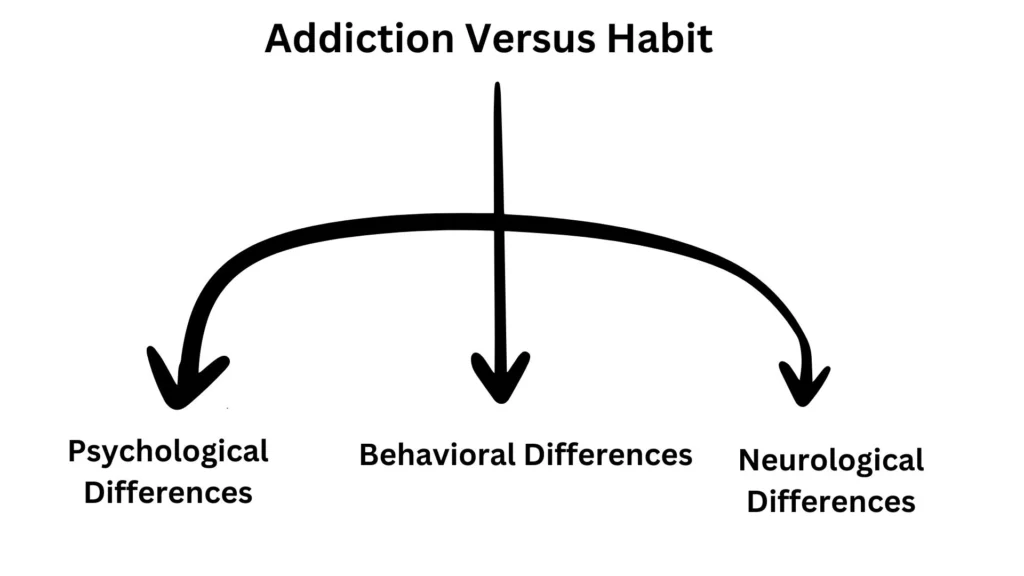Sometimes, we can’t decide whether we have a habit or an addiction. Both are present on opposite sides of the dependency scale. It is difficult to know what is the difference between a habit and an addiction, but this distinction is important.
When we don’t understand addiction versus habit, then we often think, is a habit an addiction? Those who are struggling with addiction should know the psychological, behavioral, and neurological differences between the two.
You can control a habit but not an addiction. The blog explores habit vs. addiction to make further differences between a habit and an addiction.
Table of Contents
What is A Habit?
A habit is any behavior or activity you practice daily out of your convenience. We often perform it automatically and repetitively. Habits are of two types, positive and negative, depending on your behaviors.
For example, if you do exercise daily, it is a positive habit. But if you smoke daily, it is your bad habit.
Some other examples include:
| Good Habits | Bad Habits |
|---|---|
| Daily Exercise | Procrastination |
| Reading books and study | Grunting habits |
| Brushing your teeth | Hair Twirling habits |
| Preparing and eating meals | Smoking |
Always enhance your sense of self-awareness to adopt positive habits and break bad ones. Positive habits are healthy and good, while negative habits have harmful impacts on life.
Understanding An addiction
Addiction refers to the excessive and uncontrolled practice of a certain behavior to the point where it becomes harmful. It is a chronic and relapsing disorder where you focus on something (substance or behavior). You lose control over it and then perform it excessively to a damaging and dangerous point.
American Psychiatric Association calls addiction a severe condition of SUDs, substance use disorder. SUD is a condition where one uses substances with much focus despite their harmful impacts and consequences.
For example, people are often addicted to drugs. According to the National Institute on Drug Abuse, about 130 people die in the US every day because of drug addiction.
However, we often associate an addiction with alcohol and drugs. But, believe me! I have seen various addictive behaviors in people, including tea (nicotine), coffee, mobile usage, gambling, and shopping.
What is the Difference Between a Habit and an Addiction?
You can get the idea of addiction versus habit from psychological, behavioral, and neurological differences between a habit and an addiction. These differences are discussed as follows:

1. Psychological Differences
We learn a habit and perform it automatically through repetition. Habits are developed after going through a neurological loop, also known as a habit loop.
James Clear has divided the habit loop into three parts. Which are:
- A cue is the trigger of some action or activity. It can be anything, including signal, thing, the presence of a person, or other environmental factors.
- Once the cue triggers an action, you perform it, and it is called routine.
- Lastly, reward is the positive feelings or pleasure you get after performing that action or behavior.
Once you get the reward, your brain reinforces the loop, and thus, you repeat the action or behavior known as a habit.
On the other hand, an addiction involves the neurotransmitter dopamine and the reward system of the brain.
- The addictive behavior leads to pruning the synapses in the prefrontal cortex of the brain to focus on the cues related to the target behavior or substance.
- The cues trigger the release of high dopamine. It creates an intense feeling of euphoria, which causes the brain to seek pleasure or reward. To get the pleasure (reward), you perform the activity or behavior to a harmful point.
2. Behavioral Differences
There are also some behavioral differences between a habit and addiction.
A habit is generally goal-directed behavior that serves a specific function. You can adapt habits, and in turn, they contribute to your overall well-being. Habits promote your healthful routines in everyday life.
You can also change your habits according to certain situations. For example, because of the effects of inflation on consumers, you can change your buying habits.
An addiction is characterized by a loss of control and being preoccupied with consuming the substance or engaging in the addictive behavior.
It often results in negative consequences, as you will:
- Neglect responsibilities
- Conflict in relationships
- Function improperly in your life
For example, once you are addicted to screen time, it will impair your responsibilities and other life routine.
3. Neurological Differences
Addiction versus habit is often described with neurological differences.
Your habitual activities involve neural pathways. These pathways become strengthened through repetition and reinforcement. Over time, your habits become automatic and require less effort to start.
Habit formation involves the basal ganglia and prefrontal cortex of your brain. These regions in the brain are associated with procedural memory and execute the functioning, respectively.
In contrast, in addictive behaviors, some complex changes occur in your brain’s reward system, particularly in the mesolimbic dopamine pathway.
The uncontrolled addictive behaviors lead to the neuro-adaptation. This leads to tolerance, dependence, and cravings.
Some neurotransmitters, such as dopamine, serotonin, and endorphins, play crucial roles in the development and maintenance of addictive behaviors.
Some Key Differences Between A Habit and Addiction
The following differences explain habit vs. addiction.
| Habit | Addiction |
|---|---|
| Perform without harm | A chronic disease that changes your behaviors and patterns |
| Easier to break | It isn’t easy to give up |
| Become an unconscious part of mental activities | Not part of unconsciousness |
| Minimal efforts are required to change | A long-term plan is required to treat |
| Do not affect others and society | Affect society and others |
| No withdrawal symptoms on missing or breaking | Withdrawal symptoms can be experienced upon missing |
How do you know whether you have a Habit or an Addiction?
After understanding the difference between a habit and an addiction, you can identify whether you have a habit or an addiction.
To distinguish between the addictive and habitual behaviors, you should ask yourself the following questions:
- Am I doing the behavior more than I planned?
- Is it difficult to stop engaging in the behavior even if I want to stop?
- Are there any negative consequences of the behavior on society and me?
- Does the behavior affect my daily schedule and responsibilities?
- Do others think negatively of my behavior?
- When I stop the behavior, do I experience the withdrawal symptoms like anxiety?
Now, sit down and think! If your answer to these questions is YES, then prepare to withdraw from the behavior and try to stop it. You can get advice from the experts or get treatment before it’s too late.
Habit vs. Addiction: Examples
There are various examples of addiction versus habit. Some of the examples that illustrate the difference between habit and addiction are the following:
Habit Examples
1. Morning exercises
Waking up in the morning and exercising are positive habits. Initially, it may be hard, but with time, you can perform it easily and unconsciously. It doesn’t cause distress and anxiety when you miss it.
2. Daily Reading
Your daily reading is an example of habit. Some people often develop reading habits before bed. Reading has no negative impacts on you, and it boosts your knowledge and intellect. Similarly, reading before bed can also cause good sleep.
If you miss it, you will experience no withdrawal symptoms such as distress or anxiety.
3. Study Routine
Developing an effective study routine is a healthy habit. You can develop it by setting achievable goals, breaking down large tasks into small ones, and determining the best time to study. Effective study can help you achieve academic success.
The habit of study is easy to develop and stop. Similarly, effective study habits have good consequences.
Similarly, you can also explore how much time it takes to break a habit.
Examples of Addiction
Some examples of addiction will make you clear about the difference between a habit and an addiction. These are:
1. Alcohol Addiction
Alcohol-addictive people often experience a compulsive need to drink alcohol despite its bad consequences. Although, according to the statement that best describes alcohol drinking, most college students in the US are not heavy drinkers, but some are heavy drinkers.
Heavy drinking is an addiction that is hard to give up. When you try to stop this addiction, it causes withdrawal symptoms.
2. Drug Addiction
Those who are addicted to drugs like heroin, cocaine, or prescription opioids experience a strong craving for the substance. Drug addiction disrupts your life, relationships, and responsibilities.
There is a clear difference between a habit and this addiction. It has bad consequences for individuals and society. Its treatment needs proper pattern and time.
3. Pornography
Porn addiction has severe bad consequences on you and those who are close to you. With the rise of technology, every person has a mobile phone, and the majority of them are addicted to watching porn content.
About 40 millions of Americans visit porn sites regularly. This excessive pornography is an addictive behavior that affects their health and well-being.
When and How Does Your Habit Become an Addiction?
Knowing when your habits become addictions is a good approach to maintaining a healthy life.
As you know, the main difference between a habit and an addiction is whenever you lose control over a certain behavior, you become addicted to the behavior.
Usually, we develop addictions from our habits in moments of vulnerability.
For example, when you want escapism, you go to the bar and start drinking alcohol. Similarly, sometimes, you start smoking for inclusion. Initially, these behaviors are simple habits, but over time, you become addicted to them, and then these are far more destructive and hard to stop.
Just like drinking and smoking, initially, I had the habit of using my mobile for a specific purpose only. But later on, to escape from my responsibilities, I started using social media and watching reels. At these moments, my habit became an addiction.
Conclusion
The difference between a habit and addiction is the key to recovery from any addiction. Involving in behavior to a harmful point is addiction while performing any activity to a controllable point is a habit. Once you learn habit vs. addiction, you can easily withdraw from the addictive behavior. Habits are psychologically, behaviorally, and neurologically different from addictions. These differences make clear the query is a habit, an addiction, and enlightens the way of recovery for those who are struggling to get out of addictive behaviors.
FAQs
Which is easier to stop, a habit or an addiction?
Relatively, a habit is easy to stop as compared to an addiction. You can stop a habit permanently through your willpower and conscious efforts. It is the difference between a habit and addiction that addiction is hard to give up, and it needs proper planning, treatment, and time. You can stop a bad habit of lying, but it is much more difficult to break an addiction.
What are the 4 essential components of addiction?
Experts view four factors that differentiate an addiction from a habit. The following components are classified as 4 C’s.
I. Compulsion: Addictive behavior will force you to act again and again
II. Desire: there is a strong attraction to addiction as compared to a habit.
III. Control: You can control habits easily but not addictions.
IV. Consequences: Addiction has negative consequences on you and society.
How are hobbies different from addiction?
A hobby is any activity that is good for your mental and overall health. Usually, you enjoy the activity and try your best to perform it daily. Upon missing the activity, you will not feel any anxiety or restlessness. On the other hand, addiction has bad consequences on your overall well-being, and when you fail to perform an addictive behavior, you start craving it and feel anxious. Also, when you stop it, you feel withdrawal symptoms.




